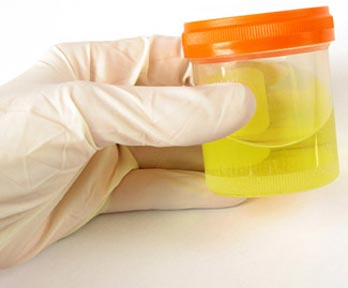|
Health Check:
What your pee is telling you
Sometimes it's surprising how unexpected simple things can tell us a
lot about our state of health. Take for example the colour of urine -
colour changes in urine can be an early indicator of potential health
problems. How often do you sneak a peek at your urine? If you are like
most people, you probably don't bother, right?
During your lifetime, your kidneys will work very hard to filter over
one million gallons of water. Urine is about 95 percent water and 5
percent uric acid, the stuff that your body does not need - including
minerals, enzymes and salts that are dangerous if they accumulate in
your body.
 Urine
can fluctuate in colour and odour depending on what you are eating and
drinking, how active you are, the time of day, or what supplements you
are taking. However, urine colour and odour can also be an indication of
something more serious. Urine
can fluctuate in colour and odour depending on what you are eating and
drinking, how active you are, the time of day, or what supplements you
are taking. However, urine colour and odour can also be an indication of
something more serious.
Here is a quick pee primer to fill you in on what you should look for
and what your urine may be telling you.
Super clear or transparent
If your urine is super clear, it may mean you are drinking too many
fluids. Be careful not to over-hydrate. The best rule of thumb is to aim
for half of your body weight in ounces each day. This means, if your
weight is 120 pounds, you should be drinking 60 ounces of water per day.
More serious conditions, such as acute viral hepatitis or cirrhosis, can
also cause your pee to turn very clear. However, you will also have
other symptoms, such as skin yellowing, nausea or vomiting with these
conditions.
Dark yellow coloured
Urine that is dark yellow in colour is still considered within a
normal range for healthy individuals. However, it also likely indicates
you may not be as hydrated as you should be.
Honey or amber coloured
These darker, orange hues are usually a good indicator that you are
becoming dehydrated. It is best to increase your water intake and then
check to see if the colour returns to a normal yellow range. When
combined with pale-coloured stools, orange urine may be an indication of
liver problems.
Neon yellow coloured
Glowing yellow urine may be the result of excess vitamins that are
not being absorbed by your body. It is best to eat a diet loaded with
whole foods and stick to whole food supplements that your body can
absorb.
Light to dark orange coloured
This is a somewhat ambiguous colour because it could mean something
or nothing. This tint can be caused from food dyes, dehydration, or
actual health problems with your bile duct or liver. It is always best
to check with a physician.
Brown or cola-coloured
This colour is a possible sign of serious dehydration or even
possible liver disease. Immediately increase your water intake and check
to see if the colour lightens. If this darkened coloration persists, you
should follow up with your physician.
Light pink to darker red coloured
This is hard to interpret. Many foods can cause urine discoloration,
such as beets and blueberries. Medications can also contain dyes and
compounds that can change the colour of your urine. However, it might
indicate the presence of blood in the urine, but many times blood in the
urine is not visible to the naked eye. There are a number of possible
causes that would lead to blood in the urine, like kidney disease,
urinary tract infections, and prostate issues. It is always best to
consult with your physician to be sure.
Other considerations
Besides colour, it is a good idea to pay careful attention to other
urine abnormalities including the following:
Cloudy urine
If you are having low back pain, lower abdomen pain, or urinary
urgency combined with cloudy urine, see a physician. Cloudy urine may
also be the result of kidney stones, generally accompanied by great
pain.
Fizzy or foamy urine
Besides the colour, it's important to take notice if your urine
appears to be fizzy or foamy. If this only happens on rare occasions
then it is likely just a benign cause. If it is occurring regularly, it
may be indicating possible high levels of protein in the urine. When in
doubt, it is best to get it checked out.
Other reasons for a change in urine odour include the following:
• Medications and supplements - some may change the colour of urine.
• Diet - certain foods, such as asparagus, cause urine to smell foul.
• Diabetes - can cause urine to smell fruity or yeasty.
The most important thing to remember when checking your urine colour
is that it can change to a myriad of colours due to a number of factors.
Just knowing what normal urine should look and smell like provides a
useful measuring tool. See a physician if your urine changes colour and
the colour persists or is accompanied by other symptoms.
Though it may sound a little strange, paying attention to the colour
of your urine may be a warning sign to catch early health problems.
- The Alternative Daily |

